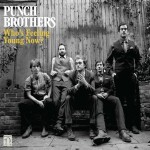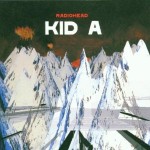The band Punch Brothers uses traditional bluegrass instrumentation – mandolin, fiddle, guitar, banjo, and stand-up bass – but their repertoire is certainly not limited to traditional bluegrass music. Indeed, they push the boundaries of what can be done in such a format, both with their original songs and with covers of the likes of Radiohead’s “Kid A”.
This interview was with Punch Brothers bass player Paul Kowert for a preview article for their show at the Lobero Theatre in Santa Barbara on 12/4/12. It was done by phone on 11/30/12.
Jeff Moehlis: What can we look forward to at your upcoming show in Santa Barbara?

Paul Kowert: We’ve been touring behind our record Who’s Been Feeling Young Now? for basically the whole year. We’re playing a lot of songs off that record, but as usual we do a sampling of of all the records we’ve made. Then we’re throwing in a couple of new things, since we’ve been on the road for a while. We’ve been on some compilations recently – The Hunger Games soundtrack, and the holiday compilation at Starbucks. And we’ll also be drawing from some of the older repertoire that predates the band. So we’re playing a lot of songs off Who’s Been Feeling Young Now?, but also throwing in some other things to keep it fun for us.
JM: How do you prefer to classify the style or the genre of The Punch Brothers? Is it bluegrass, or contemporary bluegrass, or something else, or do such labels matter?
PK: I think those labels matter most for people who want to sell music. You know, you have to put a record in some pile. Whenever you do that you’re going to simplify one’s perception of what they’re hearing. “Bluegrass” – it’s going to conjure up sounds that are absent in our group. We just have so many influences… it’s going to be impossible to classify.
JM: What is special to you about playing live versus recording in the studio?
PK: Playing live is fundamentally different from playing in the studio. You know, you’re in a room with an audience and there’s no re-do’s. The spontaneity and the energy in the room is something that is different than when you’re in a recording studio.
There’s an effort to put on a good show, as well, which is something that is absent in the recording process. We love to play live. Things are different every night. You know, the show will never be the same between nights. We change the setlist every show, and every song will sound a little different every night.
JM: I understand that you have classical music training. How has that affected what you do in the Punch Brothers, or is that a totally separate beast?
PK: Well, I’m sure it’s affected my approach to music immensely. How has it affected my approach to Punch Brothers? It’s hard to say. Everyone has had some amount of formal training in the band, although I guess the experiences there are different.
I’m a little less steeped in my traditional bluegrass than the other guys are, quite a bit less steeped. I’m learning a little bit more than everybody else when we’re playing bluegrass, I think maybe. But as far as how I approach music, it’s all more similar than different. I don’t really draw a clear line between what I studied in school and what I play with the Punch Brothers.

JM: I really like the band’s arrangement of Radiohead’s “Kid A”. How did that come together?
PK: We play at Telluride every summer, the Telluride Bluegrass Festival. That’s a real special point in the year for us. It’s a place that we love to return to, and we feel like we get a little break from our normal lives there. We’re in a different place, and a lot of friends are there. Musically it’s a really rich environment, and we try to do something special while we’re there sometimes.
One year we did a bluegrass set on the Main Stage, and when we played the Opera House late at night we did a Radiohead set. So we worked up a bunch of Radiohead songs. That was a song that we were all attracted to, just as fans of Radiohead, and we quickly realized that it might be a possibility to do that song, with the bass doing the vocal parts. The words are not intelligible, on the recording anyway.
One of the main purposes of doing the Radiohead set was to show how good their writing and music is. Playing the same music and same parts on different instruments kind of put a magnifying glass on that, I think. So you see that they’re not just… Some people might think that they’re getting all this studio magic stuff, and making really cool sounding music from being in a studio. But really, the songs are really good. The parts and the arrangment are pretty much identical to the recording. Although it’s changed over time. It’s kind of morphed. We were playing it a long time before we recorded it for Who’s Been Feeling Young Now?
JM: Do you know, has the band Radiohead ever heard the song or reacted to it?
PK: Not that I know of. I would love to hear it… maybe or maybe not.
JM: What advice would you give to an aspiring musician?
PK: Trust what you love, and try to make more of it.
JM: What are the band’s plans for the near future? Is there a new album coming up?
PK: Yeah. We’ll be finished touring behind this record in February. We’ll play a few gigs here and there. Then we’re going to be writing, eight to ten weeks of writing together. We want to give ourselves enough time to make a really great record. We’re going to give ourselves more time than we’ve ever had before. We’re not sure when it’ll come out yet, but it’s exciting.


Discussion
No comments for “Interview: Paul Kowert”